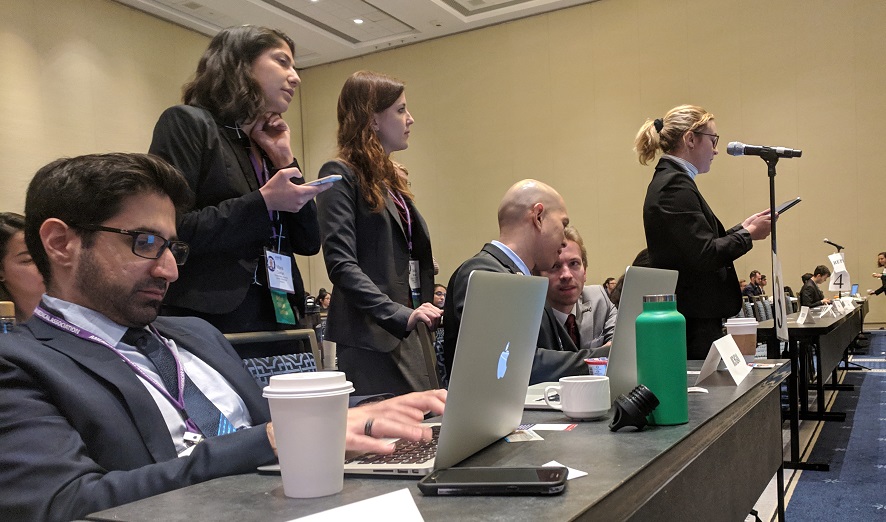
Wayne State University School of Medicine student made their voices heard at a national meeting of the American Medical Association earlier this month.
Twenty-five students from the WSU chapter attended the AMA Medical Student Section interim meeting held Nov. 8-10, and the AMA House of Delegates meeting held Nov. 10-13, in National Harbor, Md. The WSU group was the largest contingency from the region.
"Countless hours of hard work and dedication came to fruition over the weekend at the American Medical Association Interim Conference as our AMA chapter further advanced its status as a premier student-led medical advocacy affiliate," said AMA Chapter President and Class of 2021 student Aaron Sherwood. "We could not have made these accomplishments without the support of the faculty and administration here at Wayne State."
The School of Medicine Alumni Association's annual fund provided transportation and accommodations for the student attendees.
"Wayne State students authored five novel policies that were adopted at the highest level of the largest and most powerful association of physicians and medical students in the United States. As undergraduate medical students, we are leading meaningful change in national health care policy. Let us all be proud of the accomplishment of our fellow classmates," said AMA Chapter Vice President and Class of 2021 student Harrison Quaal.
Resolutions passed become the official stance of the AMA on the requisite topic.
Students wrote three resolutions as primary authors that passed at the Medical Student Section, including "Opposing Mandated Reporting of People Who Question Their Gender Identity," by AMA Chapter National Delegate and second-year student Brianna Sohl; "Decriminalization of Human Immunodeficiency Virus Status Nondisclosure in Virally Suppressed Individuals," by Quaal; and "Oppose Requirements of Hormonal Treatments for Athletes," by AMA Chapter National Delegate Tabitha Moses, who is in graduate year one of her M.D./Ph.D. program.
"What's really incredible about WSU, and makes our work as national delegates that much more meaningful, is the passion for justice that so many of our student-authored resolutions express," Moses said. "For instance, every resolution that passed at our interim conference with a Wayne State primary author offered protections and medical advocacy targeted primarily toward the LGBTQ+ community. And, many of the resolutions being written for the next conference focus on providing support for people with substance use disorders. It's incredible to see the way future physicians dedicate themselves to the resolution-writing process for advocating on behalf of patients, especially those in vulnerable, underserved populations."
Student-led policies passed at the meeting were covered by ModernHealthcare.com, Crain's Chicago Business, The Hill and FierceHealthcare.com
Wayne students were secondary authors on two additional resolutions that passed - "Support for Rooming-in of Neonatal Abstinence Syndrome Patients with their Parents" by Moses and "Standardizing Coverage of Applied Behavioral Analysis Therapy for Persons with Autism Spectrum Disorder" by Nina Bihani.
Four Wayne-written resolutions passed at the House of Delegates meeting, including "Increasing Patient Access to Sexual Assault Nurse Examiners" by Anum Naseem; "Support Offering HIV Post-Exposure Prophylaxis to All Survivors of Sexual Assault" by Moses; "Increased Access to ID Cards for the Homeless Population" by Connor Buechler; and "Increasing Firearm Safety to Prevent Accidental Child Deaths" by Elizabeth Martin; and one as a secondary author - "Affirming the Medical Spectrum of Gender," by Sohl.
At the Medical Student Section, national delegates like Moses advocate for resolutions written by students from their chapter. They also work with other chapters and regions to garner support and provide testimony.
"Resolution writing is a collaborative process, and we encourage students from other schools to participate. We are proud that here at Wayne the majority of our resolutions include authors from other schools, as this shows the cooperative spirit that is so important in medicine," Moses said.
Six students also presented posters at the conference:
• Sharath Kumar Anand: "Subsidence Rates After Lateral Lumbar Interbody Fusion (LLIF): A Systematic Review" (research conducted with physicians at Henry Ford)
• Luke Horton: "Unilateral Segmental Darier's Disease Associated with Neuropsychiatric Disorders" (research conducted at WSU)
• Jay Llaniguez: "Cardiac Tissue Regeneration Using a Novel Ischemia-Reperfusion Model in the Axolotl" (research conducted at WSU as part of Ph.D. project)
• Keerteshwrya Mishra: "Medical Mission Location as Compared to Country Need: A Systematic Review" (research conducted during the summer at Weill Cornell Medical College, funded by the Foundation for Anesthesia Education and Research)
• Tabitha Moses: "Classifying Types of Polysubstance Use Among Regular Heroin Users" (research conducted at WSU during M.D./Ph.D. research rotation)
• Kaleigh Olivares: "Immune Response to Group A Streptococcus Infection Under Anti-IL-6 and Anti-IL-1 Immunotherapy" (research conducted during the summer at Emory University School of Medicine, funded by the WSU Office of Medical Student Research Programs)